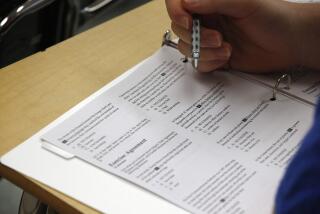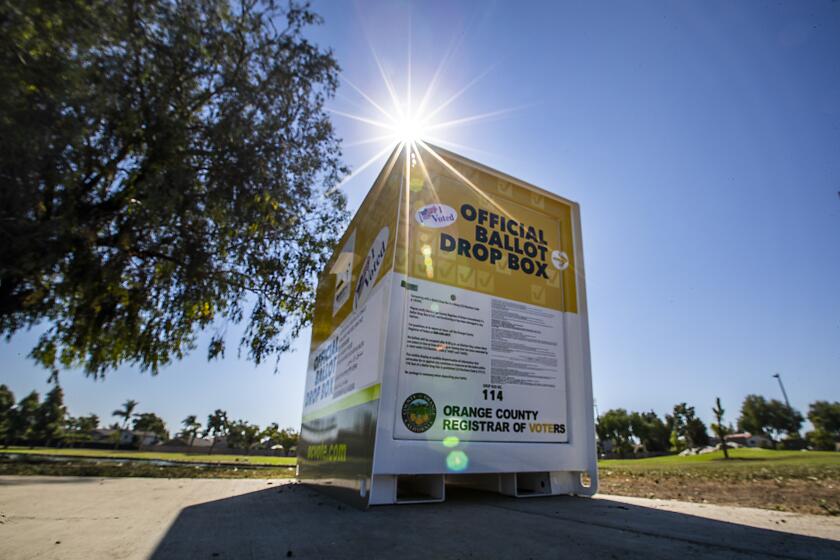UC dropped the SAT. Should you take it anyway?
Marcy Zaldana, a college counselor at Washington Preparatory High School, had big news for her 11th-graders during a Zoom meeting last week: The University of California had just dropped SAT and ACT testing requirements for admission.
The students erupted in cheers, she said. The South L.A. high school educates mostly low-income, black and Latino students who would be the first in their families to attend college — the youths who, research shows, face bias in standardized tests, potentially hurting their college admission chances.
But their elation evaporated with Zaldana’s next words: Take the test anyway.
“I told them you should consider taking the SAT if you want to have more options,” the college counselor said. “They thought it was like a free ride and I said no, no, no.”
The recent decision by UC regents to drop the SAT and ACT requirements for admission to the nation’s premier public research university system reverberated across the nation, fueling expectations that other colleges would follow suit and strike a blow at the billion-dollar standardized testing industry.
“This is a huge moment — an industry disrupter,” said Angel B. Pérez, a vice president at Trinity College in Hartford, Conn., who is the CEO-elect of the National Assn. for College Admission Counseling. “Many of us who are passionate about the test-optional movement … think it’s going to create more access for students, make the college application process simpler and might also diversify” campuses.
But it’s far from clear how quickly such changes might come — if they do. Like Zaldana, many college counselors haven’t much altered their advice: Keep studying. Take the exams. And, unless they’re disastrous, submit your scores.
“There are a whole lot of schools outside the UC system and a lot of them require the SAT,” said Lynda McGee, a college counselor at Downtown Magnets High School.
Added Heather Brown, a counselor at Los Angeles High School: “If you say you don’t need the test, you’re locking the kids into one school system.”
The demand for tests — even amid coronavirus-related suspensions of the requirement at the UC, California State University and other colleges throughout the country — remains high, causing trouble for the College Board. It canceled March, May and June tests due to the pandemic, and testing officials said they may not be able to offer a test to all students who want to take it. On Tuesday, they asked college admissions officers to hold harmless students who can’t take it in time for application deadlines.
The UC system began requiring the SAT for admissions a half-century ago, but many critics have long debated its value, expressing concern about consistent research showing that race, income and parental educational levels heavily influence the exam. The ACT and College Board, which owns the SAT, argue that their exams offer a uniform and useful tool to help predict college success and that disparate test scores among students reflect inequities in access to quality education.
But the UC regents rebuffed those arguments and unanimously approved a five-year plan to phase out the testing requirement. The exams will be optional for the next two years. The UC will go “test-blind” for California students in years three and four, meaning scores will not be considered for admission even if submitted. By 2025, the UC hopes to develop a new test.
The UC system, with 285,000 students on 10 campuses, is by far the largest institution to go test-optional. They join more than 1,200 colleges that will not require standardized tests for fall 2021 applicants, although about 200 of them adopted the policy this year amid the coronavirus crisis.
The momentum is fueled by growing research about the positive effects of test-optional policies, said Bob Schaeffer, public education director for FairTest, the National Center for Fair and Open Testing.
A 2018 study of 28 public and private colleges and universities found that test-optional policies increased applications and the diversity of applicants. About one-fourth of applicants chose not to submit scores; they were disproportionately female, low-income, first-generation and underrepresented minority students. They were often admitted at lower rates than those who submitted scores but ended up graduating at equal or higher rates, according to the study by the national college admissions counseling group.
Most admissions experts say there is little if any downside to taking the test, particularly since the College Board offers two free SAT tests for low-income students. Even Shaeffer of FairTest recommends that students at least see where they stand with a practice test, which the College Board and the online Khan Academy offer for free.
Lauren Cook of the Western Assn. for College Admission Counseling suggests researching a school’s average SAT scores to help decide whether to submit them. But McGee, at Downtown Magnets, said she encourages her students to submit scores below the average because colleges do use nuance and context in evaluating them.
UCLA, she said, has admitted her students with SAT scores in the 1300 range — about average for the bottom quartile of admitted freshmen but high compared with her high school’s average score of 1050.
“UCLA knows our school,” McGee said. “They know our kids are not going to have money for test prep.”
Indeed, working with high school counselors is one of the most important things students should do to figure out whether to submit scores, according to Youlonda Copeland-Morgan, UCLA vice provost of enrollment management.
Copeland-Morgan and several other UC admissions directors say there are no hard and fast rules about test scores but emphasize they will not look negatively at those who don’t submit them. While many testing opponents openly call the exams racist, UC admissions officials mitigate the negative impact on disadvantaged students by admitting them at higher rates than more advantaged peers and weighting grades more heavily than test scores, a UC Academic Senate review found.
Olufemi Ogundele, UC Berkeley assistant vice chancellor and director of undergraduate admissions, said his campus considers test scores alongside 13 other factors in evaluating applications, as do other UC schools. Half of Berkeley’s admitted students last fall hit SAT test scores in the 96% percentile or above. But Ogundele said the idea of a threshold qualifying score could be “problematic.”
“Students should submit all of the pieces of the application that they believe speak to who they are,” he said. “If you are proud of your test score, no matter what that score is, you should submit it. Admission officers are much more interested in students’ showcasing their excellence both in and outside of the classroom rather than those seeking perfection on standardized tests.”
UC Santa Barbara admissions director Lisa Przekop said students should consider submitting test scores that help them tell their stories. For instance, she said, those who are passionate about science, technology, engineering and math might explain what they’ve done to prepare for those fields and mention their math scores.
At UC Riverside, students should generally err on the side of submitting scores, according to Emily Engelschall, director of undergraduate admissions. Even if a total score doesn’t reach a particular level, she said, strength in one area could add value to the application. And scores that don’t help won’t be used in the admissions decision, she said.
UC admissions experts say application readers will be trained to avoid negative judgments about students who don’t submit scores.
Pérez learned firsthand not to make assumptions when he worked in admissions at Pitzer College and students told him they hit perfect test scores but chose not to submit them because they philosophically disagreed with standardized exams.
But “people bring their own story” to admissions work, he said, invariably leading to biases that must be recognized and neutralized through training. And those biases can vary widely.
One application reader at a campus Pérez declined to name didn’t much like cheerleaders so passed their applications to others to handle. Extroverts are so favored by admissions officers that Pérez had his staff read “Quiet: The Power of Introverts in a World That Can’t Stop Talking” by Susan Cain to help them adjust their views.
Such assurances, however, don’t necessarily make the testing issue any easier for students. Lizbeth Gallegos, a Washington Prep junior, said she was initially thrilled to learn that UC was dropping the SAT and ACT requirements.
But she’s going to take the SAT again anyway, even though she bombed her first try in March — scoring about 800, the 10th percentile, an outcome that “broke my heart,” she said. She spent weeks preparing for the exam through a USC tutoring program and online practice but was so nervous on test day that she mismanaged her time and finished only about 30% of the questions before hastily guessing at the rest.
Lizbeth said she’s determined to keep at it because UC campuses aren’t the only ones on her college wish list.
“Even if I do bad the second time, I’ll try,” she said, “and if I don’t get the score I want, I’ll take it a third time.”
More to Read
Sign up for Essential California
The most important California stories and recommendations in your inbox every morning.
You may occasionally receive promotional content from the Los Angeles Times.







